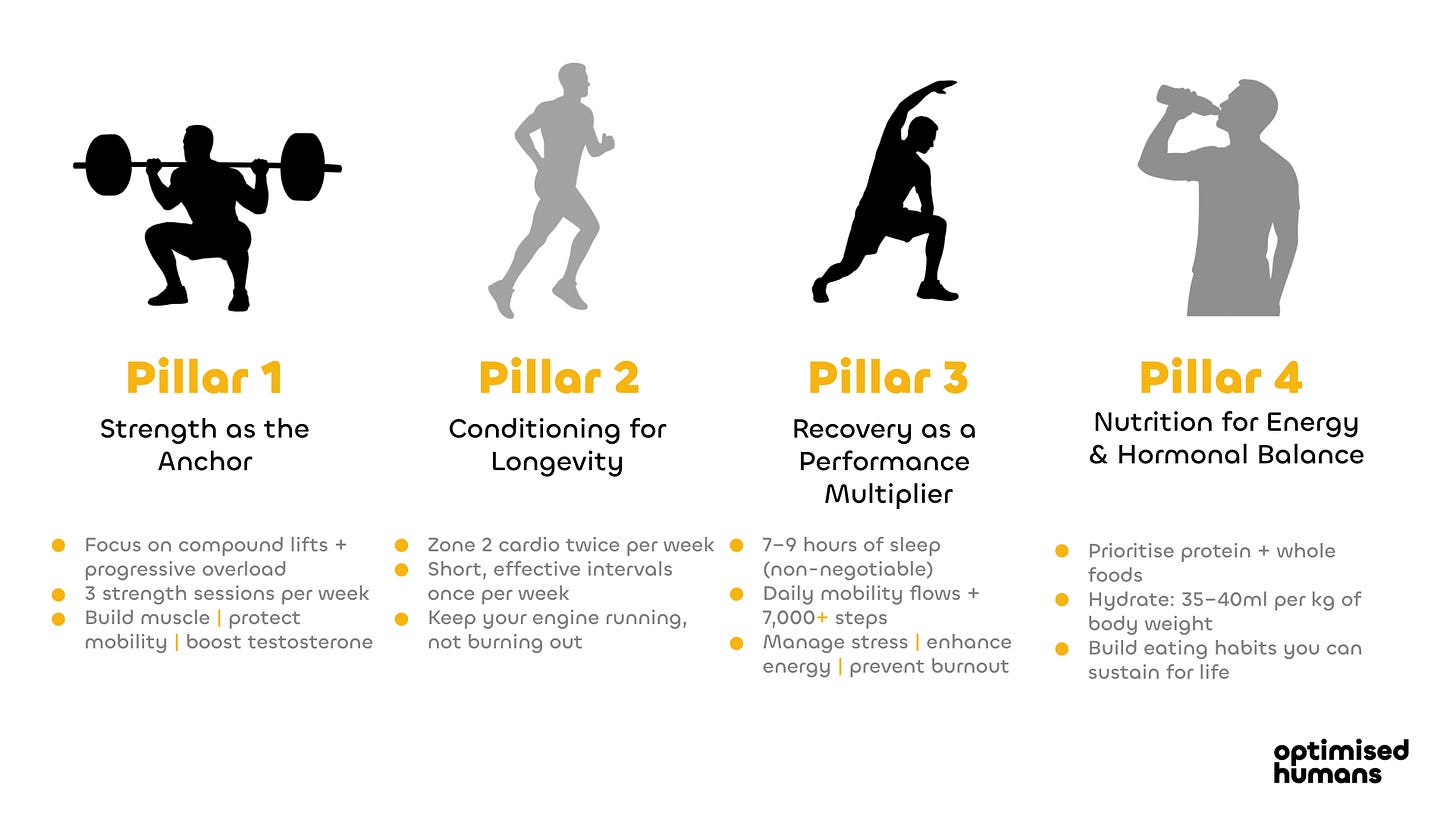First Off…
They say turning 30 makes you slow or soft, and means you’re “past your prime”.
That’s a myth!
But you know what does make you slow, though? Bad habits.
The late-night shifts that kill your sleep; the “I’ll just grab something quick” meals; the weekend “I still got it” football games where your knee reminds you you do not, in fact, “got it”.
But we understand: you’re juggling work, relationships, bills, maybe kids. Training isn’t the centre of your universe anymore. But staying strong, lean, and capable matters now more than ever. Peak performance after 30 isn’t about doing more. It’s about doing smarter.
And that’s what we’re going to dive into with this framework.
Ready?
The New Rules of Peak Performance
If your workouts still look like they did at 21: endless chest days; skipping leg day; energy drinks before every session, you’re leaving gains (and years) on the table.
Here are the new ground rules:
Rule #1: Consistency Beats Intensity
Your ego wants to max out every session. Your joints will revolt. Build a plan you can repeat for months, not something that burns you out in three weeks.
Rule #2: Recovery Isn’t Optional
Sleep isn’t for “when you can”. It’s your number one performance enhancer. You’re not 20 anymore. Treat recovery like training.
Rule #3: Strength is the Anchor
You’re not preparing to wrestle, but you are fighting gravity every single day. Muscle mass = mobility, metabolism, and testosterone insurance.
Rule #4: Health Over Hacks
Cold plunges, fancy supplements, wearable tech… they’re fun, but none of it beats building habits around sleep, nutrition, training, and stress management.
Master these rules, and you’ve already won.
The Men’s Longevity Training Framework
This is the four-pillar system we recommend. It doesn’t include any gimmicks or trends. It’s proven principles built for men who want to perform, look good, and stay injury-free well into their 40s, 50s, and beyond.
Pillar 1: Strength as the Anchor
Muscle is your retirement plan. After 30, we start losing 3–5% of lean mass per decade if we don’t fight for it. The good news is, you don’t need to train six days a week to keep it.
Focus on:
3–4 compound lifts per session (squats, deadlifts, presses, rows).
3 strength days a week, 45–60 minutes each.
Progressive overload: add small, consistent weight or reps over time.
Pro tip: Think long-term PRs, not “How much can I lift today?” Your joints will thank you.
Pillar 2: Conditioning for Longevity
Cardio is not the enemy, bro! Your heart is the engine. Ignore it, and all that strength won’t matter. But don’t overdo it either.
What to do:
Zone 2 cardio: 30–45 minutes, 2x per week (think steady-state cycling, jogging, rowing, or even a fast-paced walk).
One interval session per week: Short, high-intensity bursts (e.g., 30s sprint + 90s rest × 6 rounds).
You’re most likely not a pro athlete. So remember: you’re training to last.
Pillar 3: Recovery as a Performance Multiplier
In your 20s, you could stay out till 2 a.m. and hit the gym at 7. Now, that alone is a two-day hangover and a pulled hamstring waiting to happen.
Recovery habits that actually move the needle:
7–9 hours of sleep. Non-negotiable.
Daily mobility flows (5–10 minutes; shoulders, hips, spine).
Walking 7,000–10,000 steps daily (that’s between 1hr 40m to 2hrs 40m daily) to keep your metabolism humming.
Intentional stress management: journaling, deep breathing, mindfulness.
Treat recovery like fuel, not an afterthought.
Pillar 4: Nutrition for Energy & Hormonal Balance
You can’t out-train bad eating. And at 30+, your body doesn’t forgive junk the way it used to.
Core principles:
Prioritise protein: 1.6–2.2g per kg of body weight daily.
Eat whole foods 80% of the time; enjoy the other 20%.
Avoid extreme diets — no keto or fasting cults. Build habits you can live with.
Hydration matters: aim for 35–40ml per kg of body weight daily.
The goal is to fuel a body that performs.
5 Mistakes That Derail Men After 30
We’ve seen these mistakes wreck progress more than anything:
Training like you’re still 21: too heavy, too often, zero mobility work.
Skipping recovery: treating sleep like an optional activity.
Chasing every supplement and hack instead of fixing habits.
Eating like a teenager: high sugar, low protein, “whatever’s convenient”.
Neglecting mobility until you tweak your back tying your shoes.
The Bottom Line
You don’t need to train like a pro athlete. You just need to train like a man who wants to be strong, capable, and pain-free for the next 40 years.
Again, this isn’t about doing more. It’s about doing smarter. One rep, one habit, one decision at a time.
Remember:
Peak performance isn’t an age. It’s a choice.
Bonus
Your 90-Day Reset Plan
We’ve included something for you! It’s a habit-driven roadmap:




